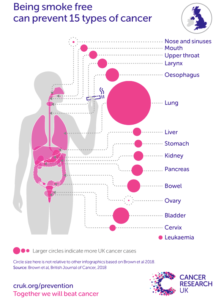Smoking
Summary
 While smoking rates continue to fall both locally and nationally, smoking remains the biggest modifiable cause of lost years of life. Smoking increases the risk of many health problems including cardiovascular disease, lung disease and multiple cancers. Many cancers are linked to smoking including, oropharynx, larynx, oesophageal, trachea, bronchus, lung, acute myeloid leukaemia, stomach, liver, pancreas, kidney, ureter, cervix, bladder, colon and rectum. See CRUK infographic.
While smoking rates continue to fall both locally and nationally, smoking remains the biggest modifiable cause of lost years of life. Smoking increases the risk of many health problems including cardiovascular disease, lung disease and multiple cancers. Many cancers are linked to smoking including, oropharynx, larynx, oesophageal, trachea, bronchus, lung, acute myeloid leukaemia, stomach, liver, pancreas, kidney, ureter, cervix, bladder, colon and rectum. See CRUK infographic.
Smoking cessation is an essential tool in reducing the incidence of these cancers. The NHS long term plan prioritises prevention and specifically mentions smoking. The North East and North Cumbria Integrated Care System (ICS) and Primary Care Networks (PCNs) are tasked with implementing this recommendation.
The regional Smokefree NHS group which is the smoking arm of the North East and North Cumbria (ICS) prevention board. It is a multi-disciplined group jointly chaired by Professor Eugene Milne and Dr Ruth Sharrock, Respiratory consultant and clinical lead for Tobacco Dependency and includes representation from senior in NHS trusts, Mental Health Services, CCGs, Local Authorities, Public Health England region team, and Fresh.
One of the aims of the group is to reduce adult smoking rates to 5% in region by 2025. The group is working with secondary care to record smoking status and offer smoking cessation to all patients admitted acutely to hospital, patients receiving maternity care and mental health inpatients. While the local authority and public health commission the smoking cessation services in the region, it is a whole system responsibility to sign post these services.
Most patient contacts, still occur in primary care about 85% of all NHS patient contacts. While primary care has always had a role in smoking cessation, recent audit data shows less and less patients attending smoking cessation services are being referred from primary care. It is important that primary care makes the most of every opportunity “Making every contact count”. That all staff (that is clinical and non – clinical) are appropriately trained using “Very Brief Advice”
PCNs should consider the PCN Smokefree Pledge as this will also address health inequalities.
Your local smoking data
www.fingertips.phe.org.uk/search/smoking – only gives local authority data and this can out of date